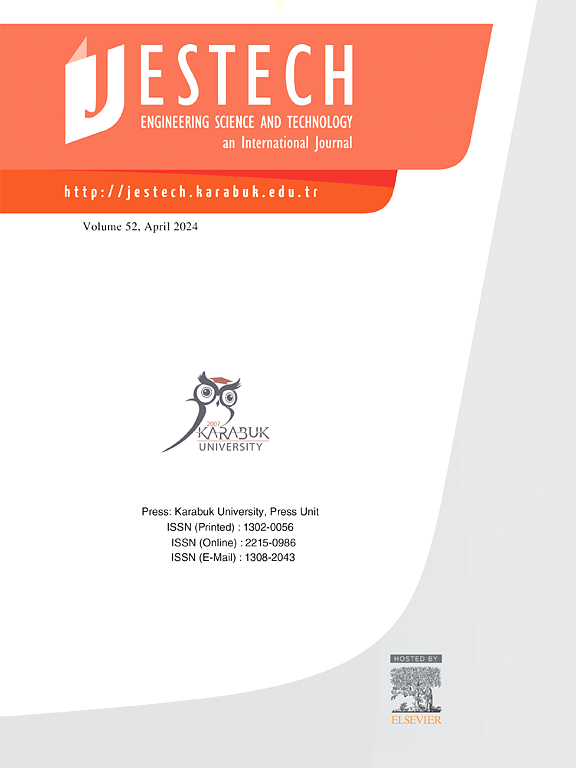混合动力系统能量协调高级优化的双方算法
IF 5.4
2区 工程技术
Q1 ENGINEERING, MULTIDISCIPLINARY
Engineering Science and Technology-An International Journal-Jestech
Pub Date : 2025-09-06
DOI:10.1016/j.jestch.2025.102165
引用次数: 0
摘要
在本研究中,采用新引入的双方优化(TFO)算法演示了一种混合微电网能源管理方法,该算法通过整合灰狼优化(GWO)和鲸鱼优化算法(WOA)来模仿自然捕食者-猎物动力学的关键特征。这种新颖的元启发式方法是专门为克服传统算法的局限性而开发的,旨在更有效地分配太阳能光伏、风能和电池存储系统之间的资源。在这项工作中,提出的TFO算法被应用于优化孟加拉国和加拿大两个地理位置不同的地点的混合微电网,这些地点具有两种独特的气候和运行条件,以测试该算法的通用性。结果表明,TFO显著提高了跨多个评估指标的系统性能。它在孟加拉国和加拿大分别实现了0.03825和0.03725的多准则函数值,优于GWO、WOA和PSO。此外,在孟加拉国和加拿大,能源均等化成本分别降至0.0354美元/千瓦时和0.0361美元/千瓦时。在这两个地区,该系统都保持了完整的可持续能源评分(SES),确保了零碳排放和能源损失。此外,供电可靠性指数(PSRI)在孟加拉国最小为1.25%,在加拿大最小为2.45%,表明系统可靠性很高。结果表明,TFO在4个测试用例中有3个显著优于GWO和WOA, p值始终低于0.05阈值,证实了TFO的稳健性和有效性。这些发现表明,TFO是优化现实世界混合微电网应用中能源系统的一种很有前途的方法。对比性能分析强调了TFO算法相对于其他成熟方法的鲁棒性、更快的收敛性和稳定性。总体而言,本研究表明TFO是智能能源系统的一个有前途的工具,为不同区域条件下高效和有弹性的混合微电网管理设定了新的基准。本文章由计算机程序翻译,如有差异,请以英文原文为准。

Novel twin fang algorithm for advanced optimization of energy coordination in hybrid power systems
In this study, a hybrid microgrid approach to energy management is demonstrated using the newly introduced Twin Fang Optimization (TFO) algorithm, which imitates the key characteristics of natural predator–prey dynamics by integrating the Grey Wolf Optimization (GWO) and Whale Optimization Algorithm (WOA). This novel metaheuristic methodology was specifically developed to overcome the limitations of conventional algorithms, aiming for more efficient resource distribution among solar PV, wind, and battery storage systems. Within this work, the proposed TFO algorithm was applied to optimize hybrid microgrids in two geographically distinct sites in Bangladesh and Canada having two unique climatic and operational conditions to test the algorithm’s versatility. The results show that TFO significantly improves system performance across multiple evaluation metrics. It achieved Multi-Criteria Function values of 0.03825 in Bangladesh and 0.03725 in Canada, outperforming GWO, WOA, and PSO. Additionally, the energy levelized costs were reduced to $0.0354/kWh in Bangladesh and $0.0361/kWh in Canada. In both locations, the system maintained the full Sustainable Energy Score (SES), ensuring zero carbon emission and energy loss. Furthermore, the Power Supply Reliability Index (PSRI) was minimized to 1.25% in Bangladesh and 2.45% in Canada, indicating a high system reliability. The results demonstrate that TFO significantly outperforms both GWO and WOA in three out of four test cases, with p-values consistently below the 0.05 threshold, confirming the robustness and effectiveness of TFO. These findings suggest that TFO is a promising approach for optimizing energy systems in real-world hybrid microgrid applications. A comparative performance analysis underscores the robustness, faster convergence, and stability of the TFO algorithm against other well-established methods. Overall, this research presents TFO as a promising tool for smart energy systems, setting a new benchmark for efficient and resilient hybrid microgrid management under diverse regional conditions.
求助全文
通过发布文献求助,成功后即可免费获取论文全文。
去求助
来源期刊

Engineering Science and Technology-An International Journal-Jestech
Materials Science-Electronic, Optical and Magnetic Materials
CiteScore
11.20
自引率
3.50%
发文量
153
审稿时长
22 days
期刊介绍:
Engineering Science and Technology, an International Journal (JESTECH) (formerly Technology), a peer-reviewed quarterly engineering journal, publishes both theoretical and experimental high quality papers of permanent interest, not previously published in journals, in the field of engineering and applied science which aims to promote the theory and practice of technology and engineering. In addition to peer-reviewed original research papers, the Editorial Board welcomes original research reports, state-of-the-art reviews and communications in the broadly defined field of engineering science and technology.
The scope of JESTECH includes a wide spectrum of subjects including:
-Electrical/Electronics and Computer Engineering (Biomedical Engineering and Instrumentation; Coding, Cryptography, and Information Protection; Communications, Networks, Mobile Computing and Distributed Systems; Compilers and Operating Systems; Computer Architecture, Parallel Processing, and Dependability; Computer Vision and Robotics; Control Theory; Electromagnetic Waves, Microwave Techniques and Antennas; Embedded Systems; Integrated Circuits, VLSI Design, Testing, and CAD; Microelectromechanical Systems; Microelectronics, and Electronic Devices and Circuits; Power, Energy and Energy Conversion Systems; Signal, Image, and Speech Processing)
-Mechanical and Civil Engineering (Automotive Technologies; Biomechanics; Construction Materials; Design and Manufacturing; Dynamics and Control; Energy Generation, Utilization, Conversion, and Storage; Fluid Mechanics and Hydraulics; Heat and Mass Transfer; Micro-Nano Sciences; Renewable and Sustainable Energy Technologies; Robotics and Mechatronics; Solid Mechanics and Structure; Thermal Sciences)
-Metallurgical and Materials Engineering (Advanced Materials Science; Biomaterials; Ceramic and Inorgnanic Materials; Electronic-Magnetic Materials; Energy and Environment; Materials Characterizastion; Metallurgy; Polymers and Nanocomposites)
 求助内容:
求助内容: 应助结果提醒方式:
应助结果提醒方式:


